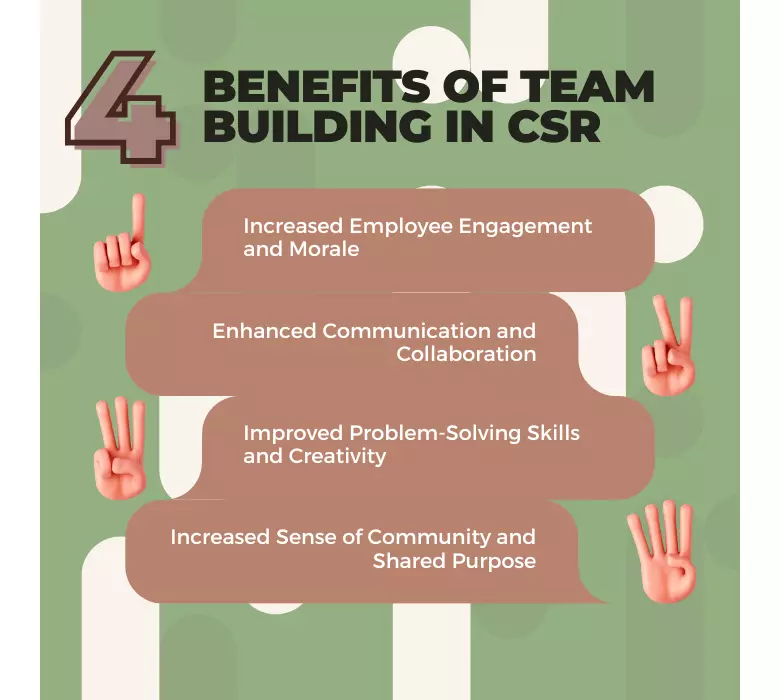Team building has long been recognized as a critical component of fostering a collaborative and efficient work environment. However, in today’s rapidly evolving business landscape, the focus on social responsibility has gained prominence. Organizations are increasingly realizing the importance of integrating social responsibility into their team-building initiatives. This shift is not just a response to societal expectations but is also rooted in the understanding that socially responsible practices contribute to a more engaged, motivated, and cohesive team. In this article, we will explore why team building should care about social responsibility and the positive outcomes it can yield.
Purpose-Driven Teams
Social responsibility infuses a sense of purpose into the fabric of an organization. When teams align their goals with a broader purpose that goes beyond profit margins, they become more motivated and inspired. Engaging in activities that contribute to social or environmental causes allows team members to see the impact of their collective efforts. This shared purpose becomes a powerful motivator, driving individuals to work towards something greater than individual success.
For instance, participating in volunteer activities as a team can create a sense of unity and fulfillment, as team members witness the positive impact they can have on their community. This shared experience builds a stronger bond among team members, fostering a sense of camaraderie and mutual respect.
Enhanced Team Morale
Socially responsible initiatives contribute significantly to enhancing team morale. When individuals feel that their organization cares about making a positive impact on society, they are more likely to feel proud of their association with the company. This increased pride and satisfaction translate into higher morale, leading to a more positive and supportive team culture.
And yet let’s get cynical for a moment: do team builders only care because they need a feel-good factor or because there’s a bigger buck in it? Maybe yes for some, the challenge for both CEOs and their human resource managers is to find team builders who are passionate and who genuinely care about the future of humankind.
Moreover, employees who are proud of their organization’s commitment to social responsibility are likely to be more engaged in their work. A team that is emotionally invested in the company’s values and mission is more likely to collaborate effectively and demonstrate higher levels of commitment to achieving common goals.
Improved Employee Engagement
Employee engagement is a key driver of organizational success. Social responsibility can be a powerful tool for enhancing employee engagement. When team members are involved in socially responsible activities, they feel a stronger connection to their workplace. This connection goes beyond the daily tasks and creates a more profound sense of belonging.
Organizing team-building events centered around social responsibility, such as participating in sustainability initiatives or community service projects, can provide employees with a sense of pride and purpose. This, in turn, leads to increased engagement, as employees are more likely to be invested in their work when they see it as contributing to a greater good.
Strengthened Team Relationships
Socially responsible team-building activities provide opportunities for team members to interact in a different context, fostering stronger interpersonal relationships. Working together towards a shared social or environmental goal allows individuals to see different facets of their colleagues’ personalities and skills. This holistic understanding of team members promotes trust and collaboration within the group.
For example, collaborating on a charitable project might require team members to leverage their diverse skills and expertise in novel ways. This experience not only builds a more resilient team but also helps break down communication barriers and enhances problem-solving abilities.
Attraction and Retention of Talent
In today’s competitive job market, attracting and retaining top talent is a constant challenge for organizations. Social responsibility has become a crucial factor for employees when choosing an employer. The key is increasingly to realise that spreading the word socially is vital for almost all organisations in attracting the the best staff. Talented individuals often seek organizations that align with their values and contribute positively to society.
By incorporating social responsibility into team-building initiatives, organizations can position themselves as socially conscious employers. This not only helps in attracting top talent but also contributes to retaining employees who value a sense of purpose in their professional lives.
Teams Can Overcome Adversity Better Than Individuals
In the contemporary business landscape, team building that integrates social responsibility is not just a trend; it’s a strategic imperative. The benefits of fostering purpose-driven teams, enhancing morale, improving employee engagement, strengthening team relationships, and attracting top talent underscore the importance of aligning team-building activities with socially responsible practices. As organizations continue to evolve, those that prioritize social responsibility in their team-building endeavors will likely reap the rewards of a motivated, engaged, and cohesive workforce.

